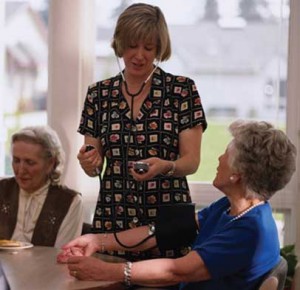One of the problems we face in our work at the Foundation is that ageism and ignorance about what it takes to provide high quality health care to older adults is so ingrained that most of the time it is hard to notice. The want-to-be cardiologist who says that he doesn’t plan to take care of older adults is real. I have met him and he is very nice, if a bit confused about demographics and billable patient populations.
We are all like fish in the sea--we couldn’t describe water if we wanted to. And yet every once in a while, something pops out that helps you see the world more clearly. In this post I want to record something a trainee said that penetrates to the fundamental attitudes and preconceptions that need to change.

We support grantees to create experiences where health professions trainees spend time with “well elders.” This was a powerful part of our project with the Association of American Medical Colleges to encourage schools to add geriatrics education to the medical school curriculum. Recently that effort, combined with the efforts of the Donald W. Reynolds Foundation, has led to the development of 26 geriatric competencies that every medical student should acquire by the time of graduation.
Many schools used this opportunity to create “Senior Mentor” programs, in which students visited older adults living in the community over the course of a year or more and got to know them as people while learning about their health conditions and concerns. This relationship promotes important general learning objectives like history taking, humanism, understanding of medication usage, and the role of social environment in health and illness. It is particularly effective for improving attitudes towards caring for older adults, because it creates an opportunity for students to see a more complete view of the older patient outside of the hospital and the acute episode. For more information, see this article by P. Eleazer et al. in the Journal of the American Geriatrics Society.
I asked one of the student participants in such a program at a good medical school what she had learned and she replied, “I learned that older people are not dead.” She flushed and was clearly embarrassed by what must have sounded as silly to her ears as it looks on the page. But she explained that seeing older people only in the hospital or even only in medical settings had limited her understanding of her future patients as people with plans, futures, and hopes--not just collections of diseases.
I don’t know what I expected to hear--perhaps a technical insight about the fragility of brain metabolism given reduced kidney function or something about the complicating effects of cognitive impairment in following treatments. But this observation is even more fundamental. To be interested in learning about how to care for patients, you have to care about the patients. Trainees need to believe that what they learn is going to matter to people--living people with hopes and dreams and even futures. Or as physician Frances Peabody in a 1925 lecture to Harvard students put it famously, "The secret of the care of the patient is in caring for the patient."
